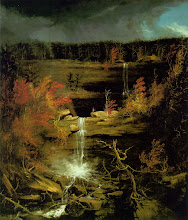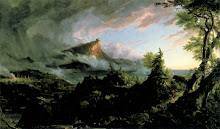First of all, I hope this guy never married.
Summary of Analytic of the Beautiful (far more than 50 words, but far less than the original):
Kant articulates the first leg of his argument on aesthetic judgement, which first involves a "taste for the beautiful" (27). Beauty, he claims, is judged by the imagination; thus, taste is judged by subjective thought. Beauty pleases without concern for purpose (45), and it provides universal satisfaction (45). He also points out that different cultures must have different concepts of beauty because they have a different set of norms (71). The fact that aesthetical judement of taste is universal presupposes and confirms the existence of a "common sense" (74,76). Ultimately, Kant notes, beauty must involve a balance between freedom and regularity (79).
Summary of Analytic of the Sublime:
Kant continues his arguement, first noting how beauty and the sublime are related, though he calls the sublime "formless" (86). He then notes two types of sublime experiences: mathematical, which evokes a sense of "infinity" through size and dynamic, which excites a sense of fear, as in the case of war or a hurricane (99). Kant clearly links the sublime to the natural world, which he claims is superior to artificial beauty (142). Kant then goes on to describe the differences between art (free play) and craft (work) as well as shows the contrast between genius, which combines imagination and understanding, versus the "bunglers," who aspire to art but fail (163). In addition, Kant describes the value of various art forms in terms of "freedom." He concludes by saying that sensitivity combined with with morality beyond the private experience would help a culture develop taste (202).
Old values:
Balance necessary (in this case sensibility with morality rather than body and mind). Emotion and reason seem to be the opposing forces rather than the physical body and mind.
Kant's sense of the mathematical "infinity" suggests Plato's "eternal."
Greeks no longer rule the art world, but different cultures have strengths (English for sublime; French for beauty).
New values:
Nature over nurture -- genius is born, not made. Kant says, " no science can teach; no industry can learn" (160). This counters the Greek scholars who suggest that one can learn great art through imitation.
I'm not sure where common sense fits in -- this seems to be a new idea.
Nature as supreme. Nature superior to art in all cases, according to Kant.
Questions:
What is the morality Kant speaks of?
Am I getting any of this right? I'm not sure.
Was Goethe a key factor in how influential Kant became? I can't imagine many people reading this!
Links:
I'm very reminded of William Blake in Kant's discussion of the sublime both as a printer and a poet. I'm also reminded of Thomas Cole's "Course of Empire" series (19th century landscapes).
Mary Shelley might be one of the three people to read Kant. In Frankenstein, her chapters where the creature and Victor meet on Mont Blanc and later at the North Pole suggest her attempt to relate to the sublime awe/fear. I'm also reminded of the story of Jonah and the Whale in terms of a sublime experience.
Subscribe to:
Post Comments (Atom)
.jpg)
.jpg)
.jpg)
No comments:
Post a Comment